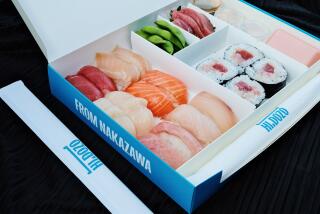Printing Shop Franchiser Makes Mark in Japan : Partnership: It took a dozen trips to Tokyo and a lot of stamina but Anaheim-based Speedy International has announced a joint venture to open five outlets.
- Share via
ANAHEIM — In doing business with the Japanese, it pays to be thick-skinned.
William Culp, president and chief operating officer of Speedy International Inc., has learned that lesson very well. It took the Anaheim quick-printing franchiser more than three months, a dozen trips to Tokyo and a lot of cajoling to persuade Japanese managers to take his company seriously.
But it was worth it, said Culp, who Monday announced a 50-year joint venture agreement with a Canon Inc. subsidiary and Maruzen Co. Ltd., a large Tokyo-based retailer, to open the first of five pilot printing shops in Tokyo in September.
While other attempts by U.S. quick-printing companies to crack the Japanese market have failed, Culp predicted that this venture, backed by two Japanese marketing giants, will probably succeed. The partners are projecting that by the year 2000, hundreds of American Speedy centers will dot cities around Japan and that sales could easily exceed $700 million annually.
Insty-Prints Inc., a Minneapolis-based quick-printing chain, tried to break into the Japanese market a decade ago, but company officials say their efforts were thwarted by a lack of understanding about Japanese culture and business practices.
“We didn’t spend enough time on the way business is interacted in Japan,” said Michael Scott, Insty-Prints’ director of franchise development. Moreover, there was strong resistance from Japan’s powerful printers union, he added.
Similarly, PIP Printing of Agoura Hills, Calif., and the now defunct Kopy Kat Inc. failed to convince the union that their presence in Japan’s competitive printing industry would not pose a threat to workers’ jobs.
Culp, whose company holds the master franchise for American Speedy printing shops in Japan, says he learned from the three companies’ mistakes and has effectively dealt with the union’s leadership.
“Every time I went to Japan, I met with members of the Japanese Light Printing Assn. to constantly reassure them that it’s not in our interest to harm or threaten the livelihood of their members,” Culp said. “We were able to convince them that we wanted to work with them to create a whole new market for the light-printing industry in Japan.”
Japan manufactures more office copiers than any other nation in the world but there are very few quick-printing shops in Japan.
While persistence played a role in sealing American Speedy’s deal, a U.S. Commerce Department official says Culp’s success is also a product of changing U.S.-Japan trade relations.
“I think we’re going to see more breakthroughs in U.S. exports of services such as franchising to Japan,” said Harry Stringer who tracks U.S.-Japan trade at the Office of International Economic Policy, an arm of the Commerce Department. “With the market opening initiatives that are now taking place, we need to see the bottom line in our exports to Japan, and we have to adapt our products to the Japanese market.”
Companies entering the Japanese market in the 1990s are likely to succeed because Japanese policymakers have agreed to open that country’s market to U.S. exports, said Andrew Kostecka, a consultant with the International Franchise Assn., a Washington-based trade group.
The franchise business has become popular in Japan in the past decade, Kostecka said. The dollar has lost nearly half of its value against the yen in recent years, making it cheaper for Japanese entrepreneurs to buy an American franchise. More important, changing economic and social conditions in Japan have created a pool of entrepreneurs who otherwise would follow the traditional practice of spending a lifetime working for a Japanese corporation, he said.
U.S. franchisers have been driven abroad by a slowdown in the U.S. franchising activity, said Anne Hayashi, assistant vice president of Link Consulting Associates International Inc., in New York. U.S. companies began searching for greener pastures in countries such as Japan, while Japanese corporations, flush with money, have been shopping around to diversify their operations, she said.
Explaining a new concept to a foreign culture can be difficult, said Pete Maddox, managing partner of the Lido Group in Orange, who developed the business plan for Speedy International’s venture.
Maddox said that during negotiations, Culp and other American managers decided that overcoming the cultural differences would take precedence over other considerations, such as the exceptionally expensive cost of commercial real estate in Japan.
Careful planning of how to deal with the Japanese culture and business practices “was uppermost in our minds,” he said.
According to 1986 Commerce Department figures, the latest figures available, Japan ranked second only to Canada in the number of franchise outlets affiliated with American parent companies. But Japan is catching up fast and will probably surpass Canada by 1991.
Most of the 69 U.S. franchisers in Japan, which operate a total of 7,366 outlets, are involved in the food industry. The U.S. franchises generate royalties in the hundreds of millions of dollars annually, according to Commerce Department figures.
American Speedy of Japan is 25% owned by Canon Sales, 25% by Maruzen and 50% by Speedy International Inc., a subsidiary of Kaiser International Inc. of Anaheim. Kaiser owns the licensing rights to American Speedy franchises in California, Hawaii, Nevada, Japan and eight other Pacific Rim countries.
More to Read
Inside the business of entertainment
The Wide Shot brings you news, analysis and insights on everything from streaming wars to production — and what it all means for the future.
You may occasionally receive promotional content from the Los Angeles Times.










